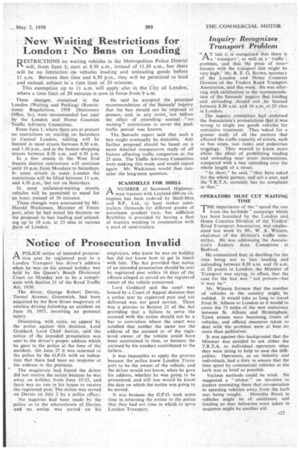Inquiry Recognizes , Transport Problem
Page 69

If you've noticed an error in this article please click here to report it so we can fix it.
" A T last it is' recognized that there is rTh. a transport ', as well as a ' traffic', probleM, and that. the price of interference with the transport. line might be very high," Mr. R. E. G. Brown, secretary of the London and Home Counties Division of the Traders Road Transport Association, said this week. He was referring with satisfaction to the recommendation of the Samuels' inquiry that loading and unloading should not be banned between 8.30 a.m. and 10 a.m. at 23 sites in -Lorid.on.
The inquiry Committee had endorsed the Association's'protestations that it was wrong to single out goods vehicles for restrictive treatment. They 'asked for a greater study of all the matters that affected the traffic capacity of streets, such as bus stops, taxi ranks and pedestrian cro4sings. They wanted to knov. more about the effect of prohibiting loading and unloading near street intersections, compared with a ban extending over the whole length of a street.
"In short," he said, "they have asked for the whole picture, and not a part, and the T.R.T.A. certainly has no complaint at that."
OPERATORS MUST CUT WAITING TIME
THE importance of the " speed the van from the kerbside " campaign which has been launched by the London and Home Counties Division of the' Traders' Woad Transport Association, N.Vas emphasized last week by Mr. W. A. Winson, chairman of the division's traffic 'committee. He was addressing the Association's Eastern Area Committee at Bedford.
He commented that, in deciding for the
time being not to ban loading and unloading between 8.30 a.m. and 10 a.m. at 23 points in London, the Minister of Transport was saying, in effect, that the case for the ban was "not proven—but it may be."
Mr. Winson foresaw that the number of vehicles in the country might, be trebled. It would take as long to travel from St. Albans to London as it would to cover the 73 miles of the new motorway between St. Albans and Birmingham. Town streets were becoming rivers of vehicles, and official measures taken to deal with the problem were at best no more than palliatives.
it was against this background that the Minister was entitled to ask either the .T.R.T.A. or individual operators what they were doing to help to ease the difficulties. Operators, as an industry and individuals, had a duty to ensure that the time spent by commercial vehicles at the kerb was as brief as possible.
Various methods could be tried. He suggested a " sticker" on invoices to traders reminding them that co-operation in speeding vehicles away from the kerb was being sought. Movable floors in vehicles might be of assiStance, and loading so that deliveries were taken in sequence might be another aid. .




















































































































































































































































